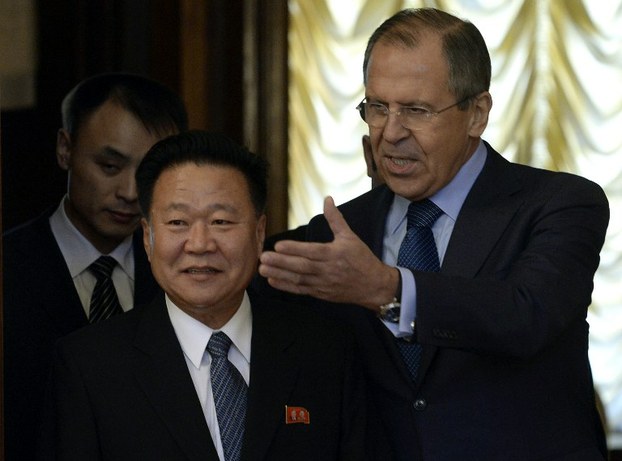North Korean economy gets boost from Russian oil, grain
| Publisher | Radio Free Asia |
| Publication Date | 3 March 2015 |
| Cite as | Radio Free Asia, North Korean economy gets boost from Russian oil, grain, 3 March 2015, available at: https://www.refworld.org/docid/5507ebc515.html [accessed 21 May 2023] |
| Disclaimer | This is not a UNHCR publication. UNHCR is not responsible for, nor does it necessarily endorse, its content. Any views expressed are solely those of the author or publisher and do not necessarily reflect those of UNHCR, the United Nations or its Member States. |
2015-03-03
 Russian Foreign Minister Sergei Lavrov (R) welcomes North Korean leader Kim Jong Un's special envoy Choe Ryong Hae during their meeting in Moscow, Nov. 20, 2014. AFP
Russian Foreign Minister Sergei Lavrov (R) welcomes North Korean leader Kim Jong Un's special envoy Choe Ryong Hae during their meeting in Moscow, Nov. 20, 2014. AFP
North Korea's economy looks set to improve this year, supported by deliveries of Russian oil and grain under the terms of favorable loans, according to North Korean sources.
Light industry especially will benefit, as Russian shipments of crude oil totaling 500,000 tons are expected to enter the country this year by sea and through pipelines in China, a source in North Hamgyong province, which borders China, told RFA's Korean Service.
"Authorities have recently told relevant officials 'Don't waste this opportunity,'" RFA's source said, speaking on condition of anonymity.
"This means they should make the most of the crude oil being sent from Russia to produce raw materials used in light industry," RFA's source said.
Crude oil, when processed, can be used to produce textiles, fertilizers, polyvinyl, and other synthetics, the source said.
Large quantities of oil were shipped to North Korea's Nampo port in late January, RFA's source said, adding that Russian oil now also steadily flows via pipelines in China to the Victory Chemical Works in the port city of Rason.
Chinese pipelines are used to transport Russian oil to North Korea because no pipeline connects the two countries directly, the source explained.
The price of gasoline and diesel have now fallen sharply in North Korean markets, and whole wheat sent from Russia is now helping to stabilize food prices in the reclusive, nuclear-armed country, a source in Yanggang province, also bordering China, told RFA.
"The price of gasoline has dropped from 11 yuan [U.S. $1.75] to 5 yuan [U.S. $0.80] per kilogram, and grain from Russia is selling at the price of 3.2 yuan [U.S. $0.51] per kilogram," the source said.
Russia has also promised to supply North Korea with electricity for this year's farming season, after a drought last year stalled much of the country's production of hydroelectric power, the source said.
Reported by Sung-hui Moon for RFA's Korean Service. Translated by Yunju Kim. Written in English by Richard Finney.
Link to original story on RFA website
